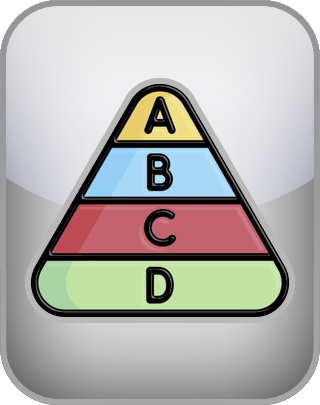Hierarchy of Needs Test
The Maslowian Needs Test is designed to help individuals assess their fulfillment across the five levels of Abraham Maslow's Hierarchy of Needs. Maslow's theory suggests that human motivation is driven by the pursuit of specific needs, starting with basic physiological requirements like food and shelter, progressing to safety, love and belonging, esteem, and ultimately self-actualization. This test provides insight into which needs are being met and where gaps may exist, offering a pathway for personal growth and well-being. By understanding these layers, you can better align your goals and actions with your intrinsic motivations.
To take the test, enter your input below.
Question 1 of 25
I have a sense of pride in what I am good at.
| Disagree | Agree |
NEXT
The IDRLabs Hierarchy of Needs Test is developed by IDRLabs. The IDRLabs Hierarchy of Needs Test is inspired by research in hierarchical need satisfaction as delineated by renowned psychologist Abraham Maslow.
The test provides feedback such as the following:
Maslow's Hierarchy of Needs is a conceptual model that organizes human needs into different levels of priority and fulfillment. Each level depends on the solid foundation of the levels below it, meaning that effective functioning at higher levels (like Esteem and Self-Actualization) relies on the fulfillment of more basic needs at lower levels (like Physiological and Safety Needs).
At the lowest levels of the hierarchy are physiological needs—basic requirements for human survival, such as air, water, food, sleep, clothing, and shelter. These needs are essential for maintaining bodily functions and staying alive. Without meeting these fundamental needs, individuals cannot focus on higher-level needs.
Once physiological needs are satisfied, individuals seek to fulfill their safety needs. These include personal security, employment, health, and property. Feeling safe and secure in one's environment is crucial for stability and the ability to plan for the future.
As individuals move up the hierarchy, the focus shifts to love and belongingness needs. These involve forming and maintaining positive relationships with family, friends, and social groups. The fulfillment of these social needs is essential for emotional health and a sense of connection with others.
Higher still are esteem needs, which encompass self-esteem, respect from others, status, and achievement. These needs involve gaining recognition and feeling valued by oneself and others. Successfully meeting esteem needs leads to a sense of accomplishment and confidence.
At the apex of the hierarchy is self-actualization, where individuals strive to realize their full potential and achieve personal growth. This level includes pursuing purpose, creativity, and self-improvement. It involves the desire to become the best version of oneself and to fulfill one's unique capabilities and aspirations.
Physiological Needs: Physiological needs, the foundation of Maslow's hierarchy, include essentials like food, water, air, sleep, and shelter. Without these, individuals cannot focus on higher needs. Struggling to meet basic needs leads to daily stress and anxiety. Fulfillment in this area allows people to concentrate on personal growth. In modern times, it also includes access to healthcare and sanitation. When these needs are secure, individuals can plan for the future and work toward higher goals like safety and relationships.
Safety Needs: Safety needs include physical, emotional, and financial security. Beyond basic survival, people seek stable jobs, safe homes, healthcare, and protection from harm. Emotional safety, such as trust in relationships and a predictable future, is equally important. When unmet, safety needs can lead to anxiety and stress, hindering personal growth. In modern life, these needs may include job stability, financial security, and freedom from discrimination, providing the foundation for pursuing higher goals like relationships and self-esteem.
Love and Belonging Needs: The need for love and belonging centers on forming meaningful connections through friendships, relationships, family, or community. People crave acceptance and care, which foster emotional security and happiness. Feeling isolated or rejected can lead to loneliness and anxiety, hindering personal growth. Strong social bonds are key to well-being, and fulfilling this need helps individuals move toward higher goals like self-esteem and personal validation.
Esteem Needs: Esteem needs focus on self-worth, confidence, and gaining respect from others. People seek both internal and external validation for their achievements, wanting to feel capable and appreciated. Esteem has two parts: self-esteem, involving confidence and mastery, and external recognition from others. When these needs are fulfilled, individuals feel accomplished and motivated. Unmet esteem needs, however, can lead to self-doubt and low motivation. Achieving esteem encourages personal growth and helps individuals progress toward self-actualization.
Self-Actualization Needs: Self-actualization is at the top of Maslow's hierarchy, where individuals focus on personal growth, creativity, and realizing their full potential. It emphasizes internal satisfaction rather than external fulfillment. People at this stage pursue meaningful goals, develop their abilities, and live authentically. They often channel their unique talents into areas like art, intellect, or humanitarian work. Achieving self-actualization brings deep fulfillment, though it can be difficult for those uncertain about their life path.
The IDRLabs Hierarchy of Needs Test is inspired by psychometric methodology and research in need satisfaction by Abraham Maslow. While the IDRLabs Hierarchy of Needs Test is inspired by scientific research, it cannot be used to provide clinical assessments or an accurate evaluation of your features. Clinical assessments should always be done in cooperation with a mental health professional. For more information about any of our online tests and quizzes, please consult our Terms of Service.

